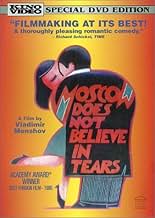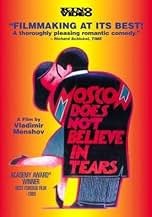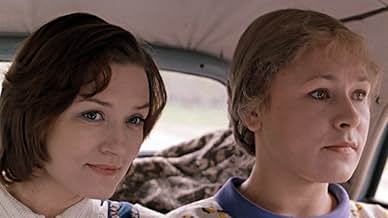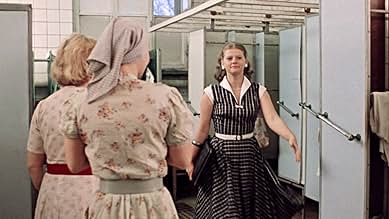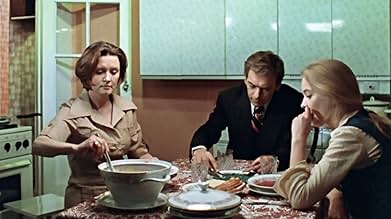AVALIAÇÃO DA IMDb
8,0/10
15 mil
SUA AVALIAÇÃO
Esta é a história de vida de três noivas desde a juventude até o outono. Seus sonhos e desejos, amor e decepções.Esta é a história de vida de três noivas desde a juventude até o outono. Seus sonhos e desejos, amor e decepções.Esta é a história de vida de três noivas desde a juventude até o outono. Seus sonhos e desejos, amor e decepções.
- Direção
- Roteiristas
- Artistas
- Ganhou 1 Oscar
- 3 vitórias e 1 indicação no total
Vladlen Paulus
- Pyotr Lednev
- (as V. Paulus)
- Direção
- Roteiristas
- Elenco e equipe completos
- Produção, bilheteria e muito mais no IMDbPro
Avaliações em destaque
This is a tribute to the Soviet era some people in Ukraine still consider to be the best years of their lives.I saw the movie in my child years, but didn't pay much attention to it. Now, when I study film history and techniques, the movie revealed to me some dark sides. "Moskva sliezam nie verit", I guess, tells a story of a humble Soviet woman in pursuit for happiness with a beloved man. This woman does not care about feminism. True love of a man-"stronghold", a man who is ready to comfort her any time she needs--that is what she is searching for in life. The movie shows some cloudy moments in the way to happiness three female friends go along. And the movie ends up where it should--an "island of placid" I watch it in original. Have to say, many phrases from the movie are cited in Ukrainian and Russian-speaking communities these days.
Culturally interesting since this occurs in a Communist country that US propaganda gave little insight on the values and realities of the people. We see idealistic poets who say the older generation made mistakes, women promoted to executive positions, a film produced by the State yet approaching sexual themes, Western idolization, the drudgery of repetitive industrial work, and class distinctions between the haves and have-nots.
Also of interest is the protagonist's view of herself. Without revealing plot twists, it is suffice to say that a woman is socially seen as submissive to the man. This is a shock to Western sensibilities of women's equality, especially as we see her ordeals as a result of a man's selfishness and dominance. What is revealing is that she, herself does not rebel against the System. She works within the parameters, creates her own success, and becomes transformed.
Being Western, I found myself questioning whether she had truly achieved something. The crown of achievement, we are taught, is independence, equality. Whereas she achieved that in a career and in her lifestyle, in her heart, she yearned for a man, to be the little wife, and to submit herself to a patriarchal marriage. But, in the end, who are we to judge another's happiness?
Also of interest is the protagonist's view of herself. Without revealing plot twists, it is suffice to say that a woman is socially seen as submissive to the man. This is a shock to Western sensibilities of women's equality, especially as we see her ordeals as a result of a man's selfishness and dominance. What is revealing is that she, herself does not rebel against the System. She works within the parameters, creates her own success, and becomes transformed.
Being Western, I found myself questioning whether she had truly achieved something. The crown of achievement, we are taught, is independence, equality. Whereas she achieved that in a career and in her lifestyle, in her heart, she yearned for a man, to be the little wife, and to submit herself to a patriarchal marriage. But, in the end, who are we to judge another's happiness?
10akoumare
This was one of the last movies I have seen before leaving Russia. I am watching it every time with a lot of pleasure. It is funny, and touching to tears some moments. It is also very realistic, as many women in Russia went through the same problems as the three girls, and it touches most of people in Russia. It is also showing that it is never late to restart and suceed in your life, and in spite of difficulties it is possible to reach your goal and success (whatever it means for you).
If you try to understand the meaning of Soviet mode of life (especially place of woman in Soviet society), this film represents the best one you can find for this purpose. The destinies of three women are depicted in clear and awesome way, and the most important you can see is that whatever happens in life, try to be optimist and to do everything not to give up living and being happy.
This is one of the most captivating love stories I've ever seen on film. It starts with a young woman (Katya, played by Vera Alentova) reporting to her Worker's Dormitory friends that she has flunked by two points the exam to get into university. It ends with the most incredible sweetness of life.
It is like a French film done by a Russian company (which is what it is). The Moscow we see that does not believe in tears does believe in love, and it is not a Moscow of politics, although some people do call one another "comrade." This is a woman's point of view film (a "chick flick") that transcends any genre cage. It begins slowly, almost painfully dull in a way that will remind the viewer of all the clichés about Russia, the unstylish dress, the worker's paradise that isn't, the sharp contrast between Moscow and the peasants who live outside the city. Katya works in a factory. She works at a drill press. She is obviously underemployed. Lyudmila (Irina Muravyova) works in a bakery. She is probably gainfully employed for the time and place. They are friends, twentysomethings who are on the make for a man, but not a man from the sticks. They pretend to be university post docs or something close to that and they impress some people as they house-sit a beautiful Moscow apartment.
This is how their adult life begins in a sense. Lyudmila falls in love with an athlete; Katya becomes infatuated with a television cameraman. One thing leads to another and before we know it they are forty. Neither relationship worked out. The athlete becomes an alcoholic, the cameraman, in the sway of his mother, believes that Katya is beneath him (once he finds out that she works in a factory). How wrong he is, of course.
But no more of the plot. I won't spoil it. The plot is important. The characterizations are important. The story is like a Russian novel in that it spans lots of time, but once you are engaged you will find that the two and a half hours fly by and you will, perhaps like me, say at the end "What a great movie!" My hat is off to director Vladimir Menshov and to Valentin Chernykh who wrote the script and to the cast. I've mentioned Vera Alentova and Irina Muravyova, but Aleksey Batlov who played Gosha was also excellent. I don't want to say anymore. Just watch the film. It is one of the best I've ever seen.
(Note: Over 500 of my movie reviews are now available in my book "Cut to the Chaise Lounge or I Can't Believe I Swallowed the Remote!" Get it at Amazon!)
It is like a French film done by a Russian company (which is what it is). The Moscow we see that does not believe in tears does believe in love, and it is not a Moscow of politics, although some people do call one another "comrade." This is a woman's point of view film (a "chick flick") that transcends any genre cage. It begins slowly, almost painfully dull in a way that will remind the viewer of all the clichés about Russia, the unstylish dress, the worker's paradise that isn't, the sharp contrast between Moscow and the peasants who live outside the city. Katya works in a factory. She works at a drill press. She is obviously underemployed. Lyudmila (Irina Muravyova) works in a bakery. She is probably gainfully employed for the time and place. They are friends, twentysomethings who are on the make for a man, but not a man from the sticks. They pretend to be university post docs or something close to that and they impress some people as they house-sit a beautiful Moscow apartment.
This is how their adult life begins in a sense. Lyudmila falls in love with an athlete; Katya becomes infatuated with a television cameraman. One thing leads to another and before we know it they are forty. Neither relationship worked out. The athlete becomes an alcoholic, the cameraman, in the sway of his mother, believes that Katya is beneath him (once he finds out that she works in a factory). How wrong he is, of course.
But no more of the plot. I won't spoil it. The plot is important. The characterizations are important. The story is like a Russian novel in that it spans lots of time, but once you are engaged you will find that the two and a half hours fly by and you will, perhaps like me, say at the end "What a great movie!" My hat is off to director Vladimir Menshov and to Valentin Chernykh who wrote the script and to the cast. I've mentioned Vera Alentova and Irina Muravyova, but Aleksey Batlov who played Gosha was also excellent. I don't want to say anymore. Just watch the film. It is one of the best I've ever seen.
(Note: Over 500 of my movie reviews are now available in my book "Cut to the Chaise Lounge or I Can't Believe I Swallowed the Remote!" Get it at Amazon!)
Você sabia?
- CuriosidadesOne of four Russian films ever to win Academy Award for Best Foreign Language Film. The other are Guerra e Paz (1965), Dersu Uzala (1975) and O Sol Enganador (1994).
- Erros de gravaçãoWhen Lyudmila and her friend approach the office building she is wearing a pair of white shoes. Once inside the building the shoes color changes to black.
- Citações
Lyudmila Gurina: Don't cry.
Lyudmila Gurina: You know what Moscow thinks of tears.
Lyudmila Gurina: We shouldn't be sitting around, we should do something.
- ConexõesFeatured in Amor e Pombos (1985)
- Trilhas sonorasAleksandra, Aleksandra
Written by Sergey Nikitin and Dmitry Suharev and Yuri Vizbor
Performed by Tatyana Nikitina and Sergey Nikitin
Principais escolhas
Faça login para avaliar e ver a lista de recomendações personalizadas
- How long is Moscow Does Not Believe in Tears?Fornecido pela Alexa
Detalhes
- Data de lançamento
- País de origem
- Central de atendimento oficial
- Idioma
- Também conhecido como
- Moscow Does Not Believe in Tears
- Locações de filme
- Empresas de produção
- Consulte mais créditos da empresa na IMDbPro
Bilheteria
- Orçamento
- US$ 900.000 (estimativa)
- Faturamento bruto mundial
- US$ 217
- Tempo de duração2 horas 30 minutos
- Proporção
- 1.37 : 1
Contribua para esta página
Sugerir uma alteração ou adicionar conteúdo ausente

Principal brecha
By what name was Moscou Não Acredita em Lágrimas (1980) officially released in India in English?
Responda

